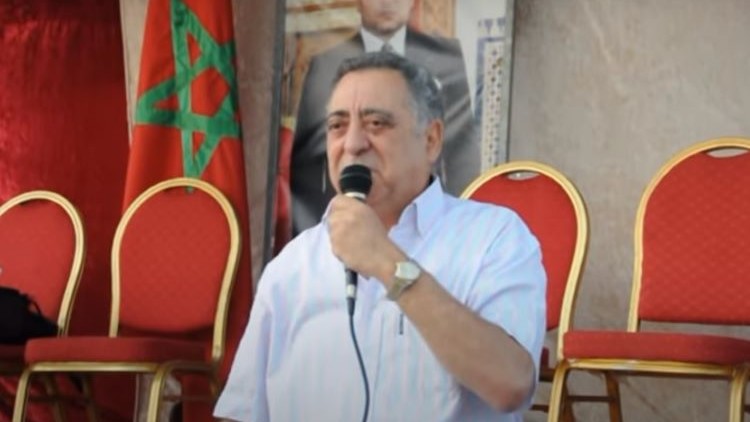Eduardo González
The Government has responded with generalities and a mere statement of intent to a parliamentary question from the PP on the imprisonment in Morocco of a lawyer and opposition leader of Spanish nationality, specifically the former Minister of Human Rights Mohamed Ziane, 80 years old.
According to the Popular Parliamentary Group, a court in Rabat ratified last November 21 the imprisonment of Ziane, born in Malaga in 1943 and with dual Spanish and Moroccan nationality. Therefore, the signatories (Valentina Martínez Ferro, Pablo Hispán and José Antonio Bermúdez de Castro) ask the Government what is its information on this case, if the former minister has been given any support from the Embassy, if the process is being followed from the Embassy in Rabat and what official communications there have been between the Governments of Spain and Morocco in relation to this case.
In its response, the Government limited itself to affirming that “Human Rights are a guiding principle of the foreign policy of the Government of Spain and from the Ministry of Foreign Affairs, European Union and Cooperation they are defended and promoted in all countries”. “Both in its bilateral contacts and in the framework of the dialogue of the European Union with the different States, Spain raises the questions related to Human Rights, in a global way and in particular cases”, it concludes. The text is dated January 30, just on the eve of the celebration, in Rabat, of the first Spanish-Moroccan High Level Meeting (RAN) since 2015, with which the government of Pedro Sanchez wanted to stage the improvement of bilateral relations with Morocco after its unexpected reversal in favor of the “Moroccanness” of Western Sahara.
Mohamed Ziane
Mohamed Ziane, founder and secretary general of the opposition Moroccan Liberal Party and Minister of Human Rights under Abdellatif Filali (1994-1998), was sentenced in February 2022 to three years in prison after the Interior Ministry charged him with eleven counts of “insulting public officials , insulting justice, adultery, defamation, sexual harassment, spreading false and slanderous information, insulting a senior state official, instigating the violation of measures to prevent the spread of COVID-19, setting a bad example to children, illegal immigration and offending the honor and sense of authority”. The Government’s official communiqué particularly emphasized his “offenses against State institutions by spreading false accusations and denunciations, punishable under the Criminal Code”.
Last November 21, an appeal court upheld the conviction, only a month after Ziane denounced, in declarations to the Spanish digital portal El Independiente, Mohamed VI’s prolonged absences from Morocco and his neglect of the kingdom’s affairs. “A king can lead a country from abroad when he is a king who has no executive powers,” but “when you have the powers that King Mohamed VI has, it is difficult to understand that a responsible person can (…) lead 40 million Moroccans from abroad using zoom, as we do now, or WhatsApp,” he denounced.
“It is a very cool way to govern a country that is two steps away from Europe and that has problems with a border in Ceuta and Melilla, with the European Union as well,” Ziane continued in his perfect Spanish with an Andalusian accent. For this reason, the former minister demanded in the interview the abdication of Mohamed VI in favor of Crown Prince Mulay Hassan, 19 years old. Precisely, the Alaouite monarch did not receive Pedro Sanchez during the RAN in Rabat because he was traveling abroad.
In the same interview, Ziane denounced that “the power in Morocco is made up of people loyal to a State which is more past than future”, affirmed that the claim to Ceuta and Melilla is “something of the past” and harshly criticized Abdellatif Hammouchi, the head of the National Police (DGSN) and of the Moroccan secret services (DGST). Mohamed Ziane is one of the Moroccan dissidents affected by the Rabat government’s spying network through Pegasus.
Mohamed Ziane was arrested in his professional office in the center of Rabat. The Moroccan Committee for the Support of Prisoners of Opinion denounced that his appeal process took place without “any opportunity for him to defend himself, and that neither he nor his lawyers were heard”, and that the agents who came to his office had not presented any formal warrant for his arrest. As a lawyer, he has been noted for the defense of the journalist Taufic Buachrin, editor of the daily Ajbar al Yaum, sentenced in 2018 to 15 years in prison for crimes of a sexual nature (Ziane assured during the trial that these accusations were false and were due to political causes), and of the demonstrators of the Hirak movement in the Rif (north) between 2016 and 2017.
The Government’s parliamentary response came on the eve of the High Level Meeting. Around the same time, Spanish Socialist MEPs voted in the European Parliament against a resolution critical of the human rights situation in Morocco, in the name of “responsibility and in favor of frank bilateral relations based on dialogue and understanding”.
Likewise, several parties of the parliamentary arc, from PP to EH Bildu, had been interested in the Spanish Parliament or in the European Parliament in the “judicial harassment” of Morocco to Ignacio Cembrero, the journalist of El Confidencial who reported on the implication of Rabat in the spying on the cell phones of several Spanish leaders (among them, Pedro Sánchez, the Minister of Agriculture and former ambassador in Rabat, Luis Planas, the former Minister of Foreign Affairs Arancha González Laya; and the Minister of Defense, Margarita Robles), and even to his own personal cell phone, through Pegasus, a “hot potato” that the Spanish Government has also done everything possible to get rid of in order not to anger Rabat.





